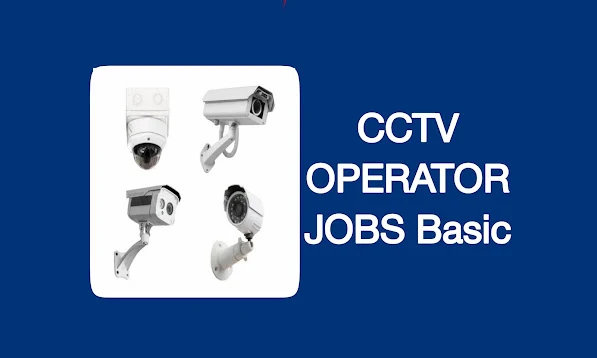CCTV OPERATOR JOBS Basic: অফিসে সিসিটিভি অপারেটর চাকরির গুরুত্বপূর্ণ নলেজ
CCTV OPERATOR JOBS Basic: অফিসে সিসিটিভি অপারেটর চাকরির গুরুত্বপূর্ণ নলেজ
সিসিটিভি অপারেটর চাকরিতে বেসিক যে যে কাজ গুলি করতে হয় সেগুলি হল:
- সিসিটিভি ক্যামেরার মনিটরিং করা
- সন্দেহজনক কার্যকলাপ পর্যবেক্ষণ করা
- নিরাপত্তা ঝুঁকিগুলি চিহ্নিত করা
- প্রয়োজনে আইনশৃঙ্খলা রক্ষাকারী বাহিনীকে জানানো
- সিসিটিভি ক্যামেরা এবং যন্ত্রপাতিগুলির রক্ষণাবেক্ষণ করা
সিসিটিভি অপারেটররা সাধারণত একটি নিয়ন্ত্রণ কক্ষে কাজ করে, যেখানে তারা একাধিক সিসিটিভি ক্যামেরার মনিটর দেখে। তারা সন্দেহজনক কার্যকলাপ, যেমন অপরাধ, বিশৃঙ্খলা বা দুর্ঘটনা পর্যবেক্ষণ করে। তারা নিরাপত্তা ঝুঁকিগুলিও চিহ্নিত করে, যেমন আগুন বা জরুরি অবস্থা। প্রয়োজনে তারা আইনশৃঙ্খলা রক্ষাকারী বাহিনীকে জানায়। সিসিটিভি অপারেটররা সিসিটিভি ক্যামেরা এবং যন্ত্রপাতিগুলির রক্ষণাবেক্ষণও করে, যাতে তারা সঠিকভাবে কাজ করে।
সিসিটিভি অপারেটর হওয়ার জন্য কোন নির্দিষ্ট শিক্ষাগত যোগ্যতা প্রয়োজন হয় না। তবে, বেশিরভাগ নিয়োগকর্তা প্রার্থীদেরকে সিসিটিভি ক্যামেরার ব্যবহার এবং নিরাপত্তা ব্যবস্থা সম্পর্কে কিছুটা জ্ঞান থাকতে চান। প্রার্থীদেরকে সাধারণত একটি অনলাইন বা শ্রেণীকক্ষ প্রশিক্ষণ কোর্স সম্পন্ন করতে হয়।
সিসিটিভি অপারেটররা সাধারণত দিনের বেলা কাজ করে। তবে, কিছু নিয়োগকর্তা রাতারাতি বা সপ্তাহান্তে কাজ করার জন্য প্রার্থীদেরকে খুঁজতে পারেন। সিসিটিভি অপারেটররা সাধারণত ভাল বেতন এবং সুযোগ-সুবিধা পান।
What are the different types of CCTV cameras?
CCTV OPERATOR Main Duties:
•Depending on the site the security systems operator may require to install the CCTV system.
(সাইটের উপর নির্ভর করে সিকিউরিটি সিস্টেম অপারেটরকে সিসিটিভি সিস্টেম ইনস্টল করার প্রয়োজন হতে পারে)
•Constantly focus and monitor the site activities via CCTV or other surveillance systems.
(ক্রমাগত ফোকাস করুন এবং CCTV বা অন্যান্য নজরদারি সিস্টেমের মাধ্যমে সাইটের কার্যক্রম নিরীক্ষণ করুন।)
•Respond to the intrusion alarm by instructing the team.
(দলকে নির্দেশ দিয়ে অনুপ্রবেশ অ্যালার্মে সাড়া দিন।)
•Control remotely such as gate, doors, or other access points.
•Be high-level vigilance
•Attention to the details of every activity.
Daily duties and responsibilities:
1. The daily system checks
2. Live video monitoring
3. Video patrolling
4. Live incident tracking
5. Retrieving recorded images
6. Proper Handover and Takeover
7. Check All Operator Room
8. Check All Communication Equipment Handel
1. The daily system checks:
•Camera status 100% functional
• The resolution of the video is good
•CCTV operating system working (controllers and software)
•Recording and retrieval system is working
•Keep a record on the daily system and check the logbook
6. Other duties:
•Security patrols on foot and in a vehicle (depending on site)
"Access control (depending on site)
•Controlling and issuing keys
•Operating as a key-holder
•Maintaining log books and registers
5. Retrieving recorded images(রেকর্ড করা ছবি পুনরুদ্ধার করা হচ্ছে):
•Internal investigations for the incident
•Training activities
• Providing the police to assist the investigation of the particular case.
4. Live incident tracking:
•Track the available camera feeds to monitor the location and activities of the parties who are involved.
(যারা জড়িত তাদের অবস্থান এবং কার্যকলাপ নিরীক্ষণ করতে উপলব্ধ ক্যামেরা ফিড ট্র্যাক করুন.)
•Report the incident location to the communication operators or directly to the supervisor.
(যোগাযোগ অপারেটরদের বা সরাসরি সুপারভাইজারকে ঘটনার অবস্থান টি রিপোর্ট করুন।)
•Report what activities have been going on there to the supervisor or communication operator.
(সুপারভাইজার বা কমিউনিকেশন অপারেটরের কাছে কী কার্যক্রম চলছে তা রিপোর্ট করুন।)
•Be vigilant to further safety and security threats during the ongoing incident.
(চলমান ঘটনার সময় আরও নিরাপত্তা এবং নিরাপত্তা হুমকির জন্য সতর্ক থাকুন।)
• Effective communication during live incident tracking is an important part of the incident response.
(লাইভ ঘটনা ট্র্যাকিং সময় কার্যকর যোগাযোগ ঘটনা প্রতিক্রিয়া একটি গুরুত্বপূর্ণ অংশ.)












আজকের আইটির নীতিমালা মেনে কমেন্ট করুন। প্রতিটি কমেন্ট রিভিউ করা হয়।
comment url